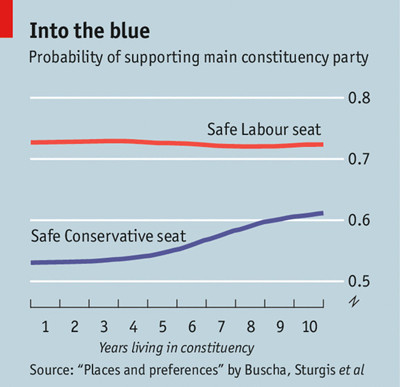投票习惯
Movers and voters
搬家与选票
Why moving house makes people more right-wing
为何搬家会让人更右翼
DO PEOPLE move to Conservative bastions in shires and small-town England because they tend to vote Tory? Or do they vote for David Cameron's party because they live in Tory strongholds? A forthcoming paper by Patrick Sturgis of Southampton University, Frank Buscha of Westminster University and others examines how people's political views change as they move house.
人们是因为想投票给保守党才搬到郡下和英格兰小镇上的保守党据点,还是因为他们居住在保守党据点所以才投票给大卫· 卡梅隆所在的政党?在一篇即将发表的文章中,英国南安普顿大学的帕特里克·斯特吉斯以及威斯敏斯特大学的弗兰克·布施等人对民众政治观点变化与住所迁移的关系进行了研究。

Mr Sturgis and his colleagues are particularly interested in the effect of moving to safe Conservative or Labour seats from any other kind. They found that the longer people live in bits of Britain that overwhelmingly vote Conservative, the more likely they are to support that party (see chart). People who move to safe Labour seats do not become more left-wing, though.
尤其令斯特吉斯和他的同事们感兴趣的是,从其他地区搬到保守党或工党稳定支持地区(对民众政治观点)所产生的影响。他们发现,人们在英国一些压倒性支持保守党的地区居住的时间越长,就越倾向于支持该党。而搬到工党稳定支持地区的人们并不会变得更左翼。
Social and economic factors such as income, age and marital status affect people's decisions about where to move, and also influence the way they vote. But the researchers tried to control for this. They still found that people tend to grow more right-wing the longer they live in Tory seats.
诸如收入、年龄和婚姻状况之类的社会与经济因素都会对人们想搬到哪里的决定产生影响,同时也会影响到他们的投票方式。研究者尝试对这些因素进行控制,但他们依然发现长期居住在保守党据点的人们会变得更加右翼。
One explanation is that Conservatives are better at nudging newcomers to join their tribe. Safe Labour seats tend to be urban, mobile and socially diverse, so people who move to them may feel less compelled to fit in. Another possibility is that people who move to Labour strongholds are already so left-wing that it is difficult for them to become stronger supporters of the party.
一种解释是保守党更擅长吸收新来者加入他们的阵营。工党稳定支持地区多为流动性更强且社会多元化的城市,搬至此地的人们或许觉得并不需要完全融入其中。另一种可能性是,搬到工党据点的人们已经很左翼,很难让他们进一步支持该党。
Safe seats do not determine the outcome of elections, so this pattern matters little in the short term, suggests Peter Kellner, head of YouGov, a polling firm. But it will matter eventually. Britain may be succumbing to a process known in America as “the big sort”, which has been blamed for growing political polarisation in that country. A Conservative victory in 2015 that secures few seats in northern England or Scotland, or a Labour win that leaves the south coloured deep blue, would not be healthy for democracy.
民治调查机构(YouGov)的负责人彼得·科尔表示,稳得席位并不代表选举稳操胜券,因而这种模式在短期内影响甚微,但最终仍将(对选举结果)产生影响。英国或将步美国“大类”之后尘,后者因日趋严峻的政治两极化而备受指责。2015大选,若保守党胜利则能保证北英格兰或苏格兰的一些席位,若工党获胜则将使南部着上深蓝色,这都不利于民主的健康发展。译者:朱大素 校对:王颖













